The Role of Artificial Intelligence in Organizational Decision-Making
VerifiedAdded on 2023/03/17
|10
|2835
|27
Essay
AI Summary
This essay delves into the significant impact of Artificial Intelligence (AI) on organizational decision-making. It explores how AI, including machine learning and predictive analytics, is revolutionizing business strategies by providing large quantities of information and expertise. The essay discusses the benefits of AI such as management of multiple inputs, and preventing decision fatigue, while also addressing the challenges and impacts of AI implementation. It examines how AI aids in making predictions, assists in multitasking, and offers better judgments, including its role in hiring processes. Furthermore, the essay explores the future of AI in decision-making, emphasizing its role in enhancing employee efficiency and improving business competitiveness through effective data analysis and recommendations. The conclusion highlights the increasing volume of unstructured data and the importance of AI in leveraging this data for better decision-making.
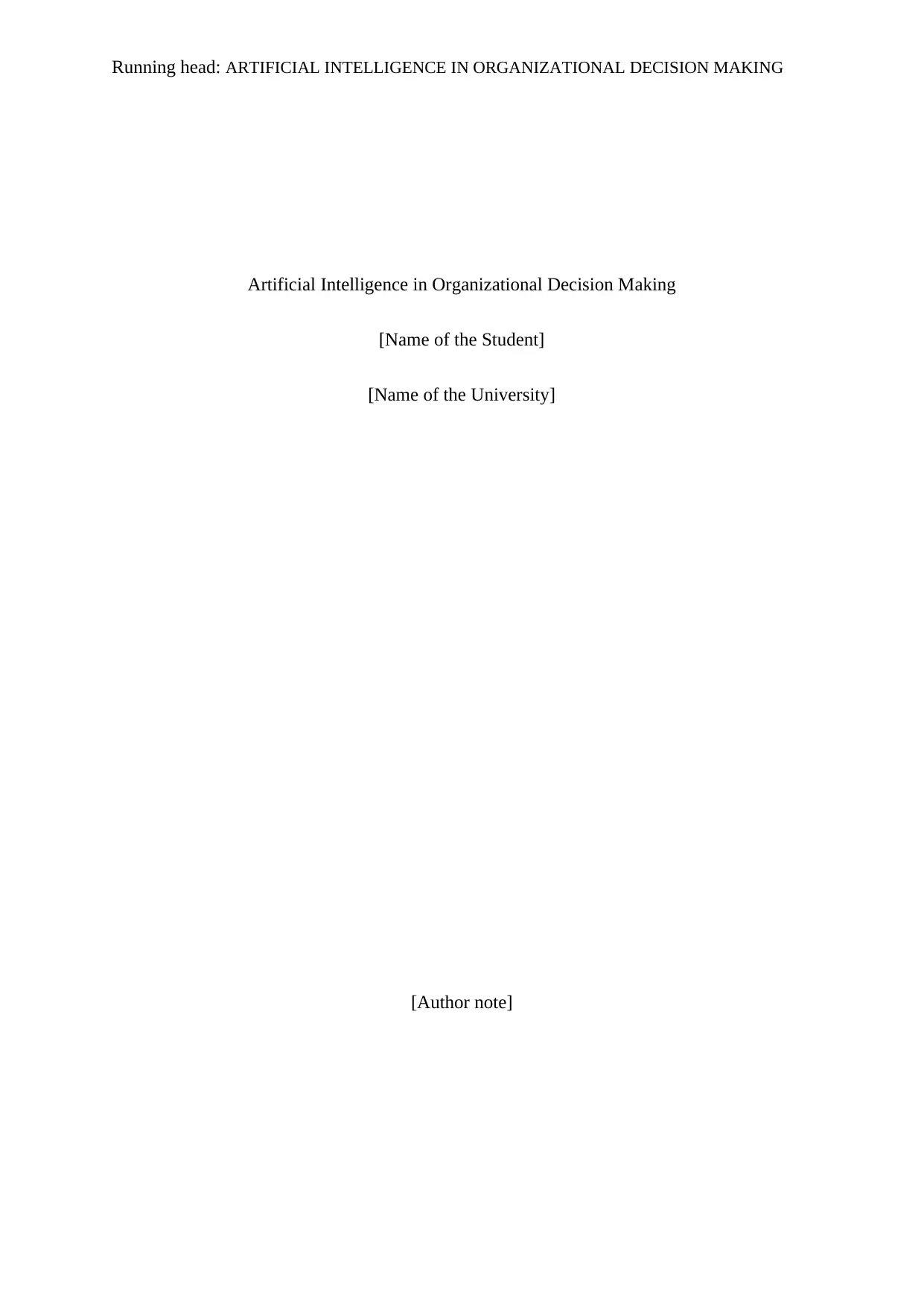
Running head: ARTIFICIAL INTELLIGENCE IN ORGANIZATIONAL DECISION MAKING
Artificial Intelligence in Organizational Decision Making
[Name of the Student]
[Name of the University]
[Author note]
Artificial Intelligence in Organizational Decision Making
[Name of the Student]
[Name of the University]
[Author note]
Paraphrase This Document
Need a fresh take? Get an instant paraphrase of this document with our AI Paraphraser
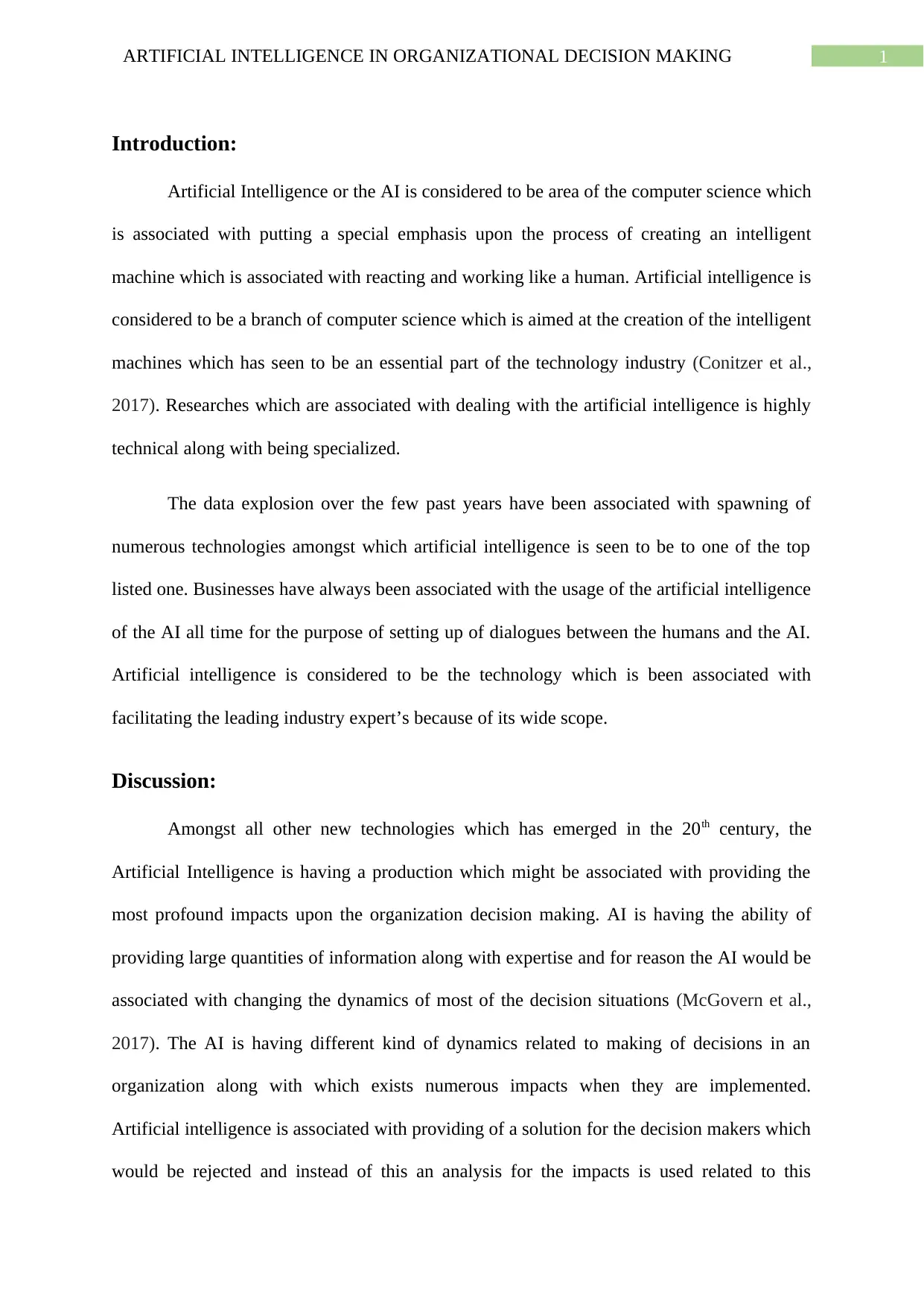
1ARTIFICIAL INTELLIGENCE IN ORGANIZATIONAL DECISION MAKING
Introduction:
Artificial Intelligence or the AI is considered to be area of the computer science which
is associated with putting a special emphasis upon the process of creating an intelligent
machine which is associated with reacting and working like a human. Artificial intelligence is
considered to be a branch of computer science which is aimed at the creation of the intelligent
machines which has seen to be an essential part of the technology industry (Conitzer et al.,
2017). Researches which are associated with dealing with the artificial intelligence is highly
technical along with being specialized.
The data explosion over the few past years have been associated with spawning of
numerous technologies amongst which artificial intelligence is seen to be to one of the top
listed one. Businesses have always been associated with the usage of the artificial intelligence
of the AI all time for the purpose of setting up of dialogues between the humans and the AI.
Artificial intelligence is considered to be the technology which is been associated with
facilitating the leading industry expert’s because of its wide scope.
Discussion:
Amongst all other new technologies which has emerged in the 20th century, the
Artificial Intelligence is having a production which might be associated with providing the
most profound impacts upon the organization decision making. AI is having the ability of
providing large quantities of information along with expertise and for reason the AI would be
associated with changing the dynamics of most of the decision situations (McGovern et al.,
2017). The AI is having different kind of dynamics related to making of decisions in an
organization along with which exists numerous impacts when they are implemented.
Artificial intelligence is associated with providing of a solution for the decision makers which
would be rejected and instead of this an analysis for the impacts is used related to this
Introduction:
Artificial Intelligence or the AI is considered to be area of the computer science which
is associated with putting a special emphasis upon the process of creating an intelligent
machine which is associated with reacting and working like a human. Artificial intelligence is
considered to be a branch of computer science which is aimed at the creation of the intelligent
machines which has seen to be an essential part of the technology industry (Conitzer et al.,
2017). Researches which are associated with dealing with the artificial intelligence is highly
technical along with being specialized.
The data explosion over the few past years have been associated with spawning of
numerous technologies amongst which artificial intelligence is seen to be to one of the top
listed one. Businesses have always been associated with the usage of the artificial intelligence
of the AI all time for the purpose of setting up of dialogues between the humans and the AI.
Artificial intelligence is considered to be the technology which is been associated with
facilitating the leading industry expert’s because of its wide scope.
Discussion:
Amongst all other new technologies which has emerged in the 20th century, the
Artificial Intelligence is having a production which might be associated with providing the
most profound impacts upon the organization decision making. AI is having the ability of
providing large quantities of information along with expertise and for reason the AI would be
associated with changing the dynamics of most of the decision situations (McGovern et al.,
2017). The AI is having different kind of dynamics related to making of decisions in an
organization along with which exists numerous impacts when they are implemented.
Artificial intelligence is associated with providing of a solution for the decision makers which
would be rejected and instead of this an analysis for the impacts is used related to this
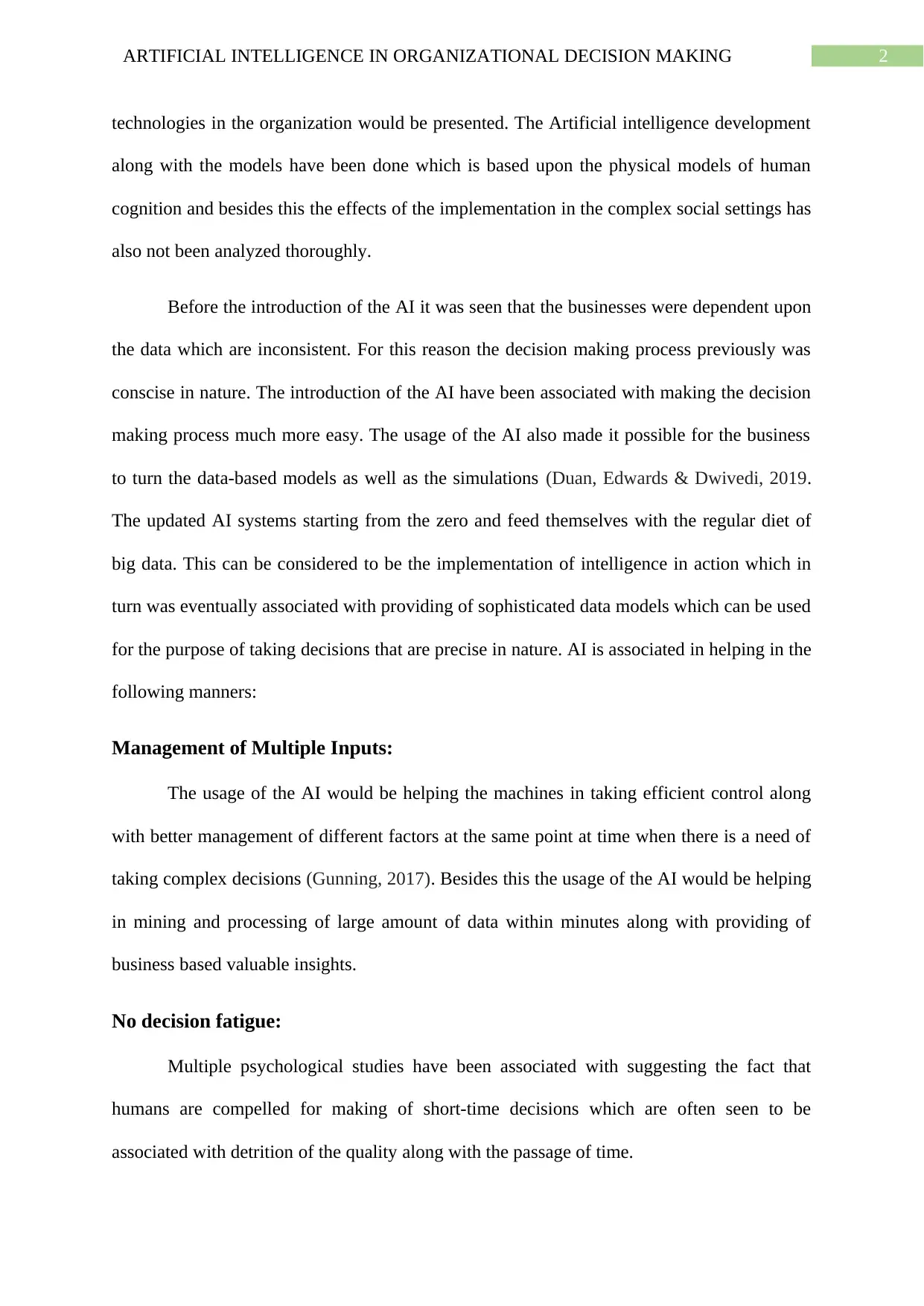
2ARTIFICIAL INTELLIGENCE IN ORGANIZATIONAL DECISION MAKING
technologies in the organization would be presented. The Artificial intelligence development
along with the models have been done which is based upon the physical models of human
cognition and besides this the effects of the implementation in the complex social settings has
also not been analyzed thoroughly.
Before the introduction of the AI it was seen that the businesses were dependent upon
the data which are inconsistent. For this reason the decision making process previously was
conscise in nature. The introduction of the AI have been associated with making the decision
making process much more easy. The usage of the AI also made it possible for the business
to turn the data-based models as well as the simulations (Duan, Edwards & Dwivedi, 2019.
The updated AI systems starting from the zero and feed themselves with the regular diet of
big data. This can be considered to be the implementation of intelligence in action which in
turn was eventually associated with providing of sophisticated data models which can be used
for the purpose of taking decisions that are precise in nature. AI is associated in helping in the
following manners:
Management of Multiple Inputs:
The usage of the AI would be helping the machines in taking efficient control along
with better management of different factors at the same point at time when there is a need of
taking complex decisions (Gunning, 2017). Besides this the usage of the AI would be helping
in mining and processing of large amount of data within minutes along with providing of
business based valuable insights.
No decision fatigue:
Multiple psychological studies have been associated with suggesting the fact that
humans are compelled for making of short-time decisions which are often seen to be
associated with detrition of the quality along with the passage of time.
technologies in the organization would be presented. The Artificial intelligence development
along with the models have been done which is based upon the physical models of human
cognition and besides this the effects of the implementation in the complex social settings has
also not been analyzed thoroughly.
Before the introduction of the AI it was seen that the businesses were dependent upon
the data which are inconsistent. For this reason the decision making process previously was
conscise in nature. The introduction of the AI have been associated with making the decision
making process much more easy. The usage of the AI also made it possible for the business
to turn the data-based models as well as the simulations (Duan, Edwards & Dwivedi, 2019.
The updated AI systems starting from the zero and feed themselves with the regular diet of
big data. This can be considered to be the implementation of intelligence in action which in
turn was eventually associated with providing of sophisticated data models which can be used
for the purpose of taking decisions that are precise in nature. AI is associated in helping in the
following manners:
Management of Multiple Inputs:
The usage of the AI would be helping the machines in taking efficient control along
with better management of different factors at the same point at time when there is a need of
taking complex decisions (Gunning, 2017). Besides this the usage of the AI would be helping
in mining and processing of large amount of data within minutes along with providing of
business based valuable insights.
No decision fatigue:
Multiple psychological studies have been associated with suggesting the fact that
humans are compelled for making of short-time decisions which are often seen to be
associated with detrition of the quality along with the passage of time.
⊘ This is a preview!⊘
Do you want full access?
Subscribe today to unlock all pages.

Trusted by 1+ million students worldwide
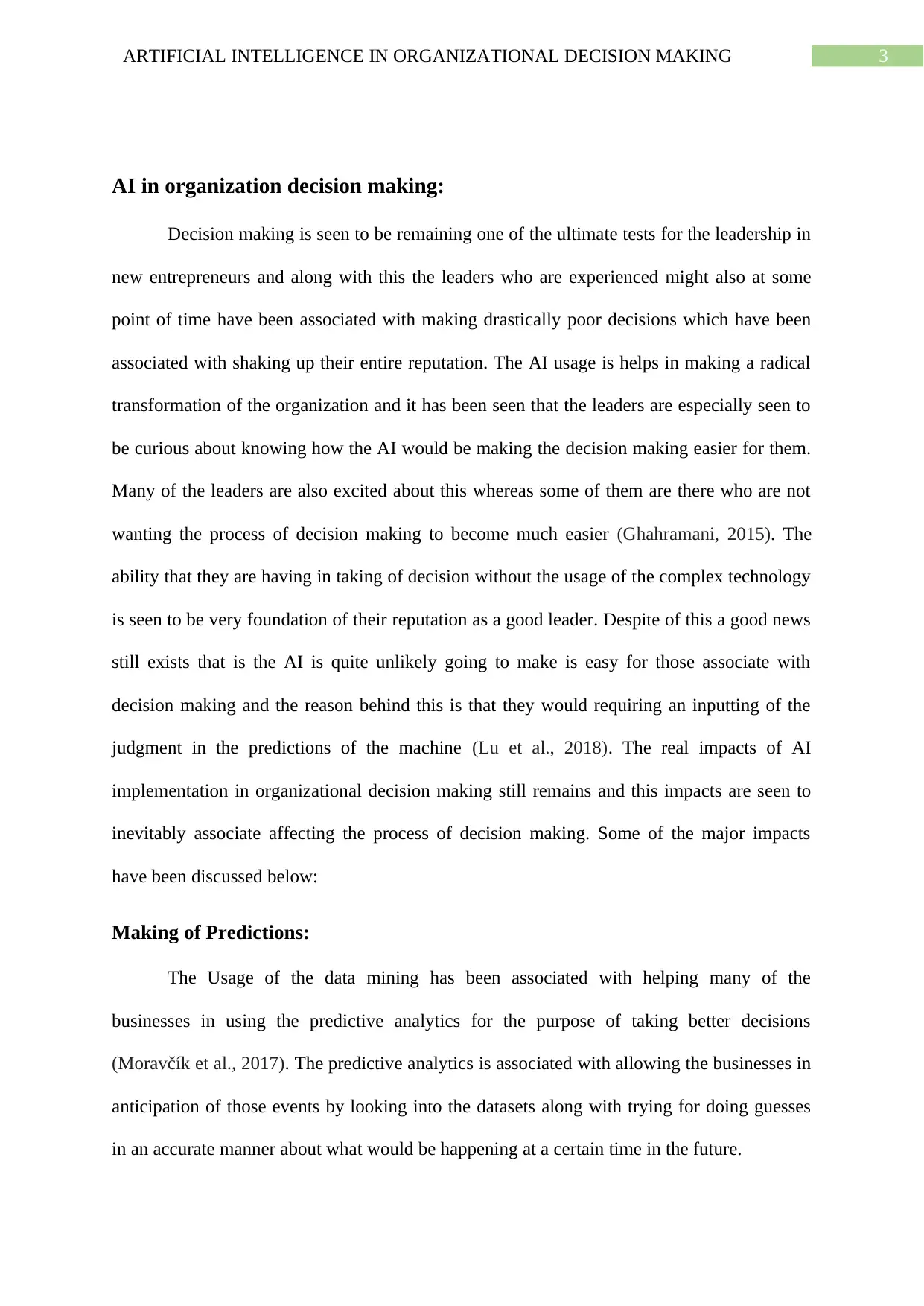
3ARTIFICIAL INTELLIGENCE IN ORGANIZATIONAL DECISION MAKING
AI in organization decision making:
Decision making is seen to be remaining one of the ultimate tests for the leadership in
new entrepreneurs and along with this the leaders who are experienced might also at some
point of time have been associated with making drastically poor decisions which have been
associated with shaking up their entire reputation. The AI usage is helps in making a radical
transformation of the organization and it has been seen that the leaders are especially seen to
be curious about knowing how the AI would be making the decision making easier for them.
Many of the leaders are also excited about this whereas some of them are there who are not
wanting the process of decision making to become much easier (Ghahramani, 2015). The
ability that they are having in taking of decision without the usage of the complex technology
is seen to be very foundation of their reputation as a good leader. Despite of this a good news
still exists that is the AI is quite unlikely going to make is easy for those associate with
decision making and the reason behind this is that they would requiring an inputting of the
judgment in the predictions of the machine (Lu et al., 2018). The real impacts of AI
implementation in organizational decision making still remains and this impacts are seen to
inevitably associate affecting the process of decision making. Some of the major impacts
have been discussed below:
Making of Predictions:
The Usage of the data mining has been associated with helping many of the
businesses in using the predictive analytics for the purpose of taking better decisions
(Moravčík et al., 2017). The predictive analytics is associated with allowing the businesses in
anticipation of those events by looking into the datasets along with trying for doing guesses
in an accurate manner about what would be happening at a certain time in the future.
AI in organization decision making:
Decision making is seen to be remaining one of the ultimate tests for the leadership in
new entrepreneurs and along with this the leaders who are experienced might also at some
point of time have been associated with making drastically poor decisions which have been
associated with shaking up their entire reputation. The AI usage is helps in making a radical
transformation of the organization and it has been seen that the leaders are especially seen to
be curious about knowing how the AI would be making the decision making easier for them.
Many of the leaders are also excited about this whereas some of them are there who are not
wanting the process of decision making to become much easier (Ghahramani, 2015). The
ability that they are having in taking of decision without the usage of the complex technology
is seen to be very foundation of their reputation as a good leader. Despite of this a good news
still exists that is the AI is quite unlikely going to make is easy for those associate with
decision making and the reason behind this is that they would requiring an inputting of the
judgment in the predictions of the machine (Lu et al., 2018). The real impacts of AI
implementation in organizational decision making still remains and this impacts are seen to
inevitably associate affecting the process of decision making. Some of the major impacts
have been discussed below:
Making of Predictions:
The Usage of the data mining has been associated with helping many of the
businesses in using the predictive analytics for the purpose of taking better decisions
(Moravčík et al., 2017). The predictive analytics is associated with allowing the businesses in
anticipation of those events by looking into the datasets along with trying for doing guesses
in an accurate manner about what would be happening at a certain time in the future.
Paraphrase This Document
Need a fresh take? Get an instant paraphrase of this document with our AI Paraphraser
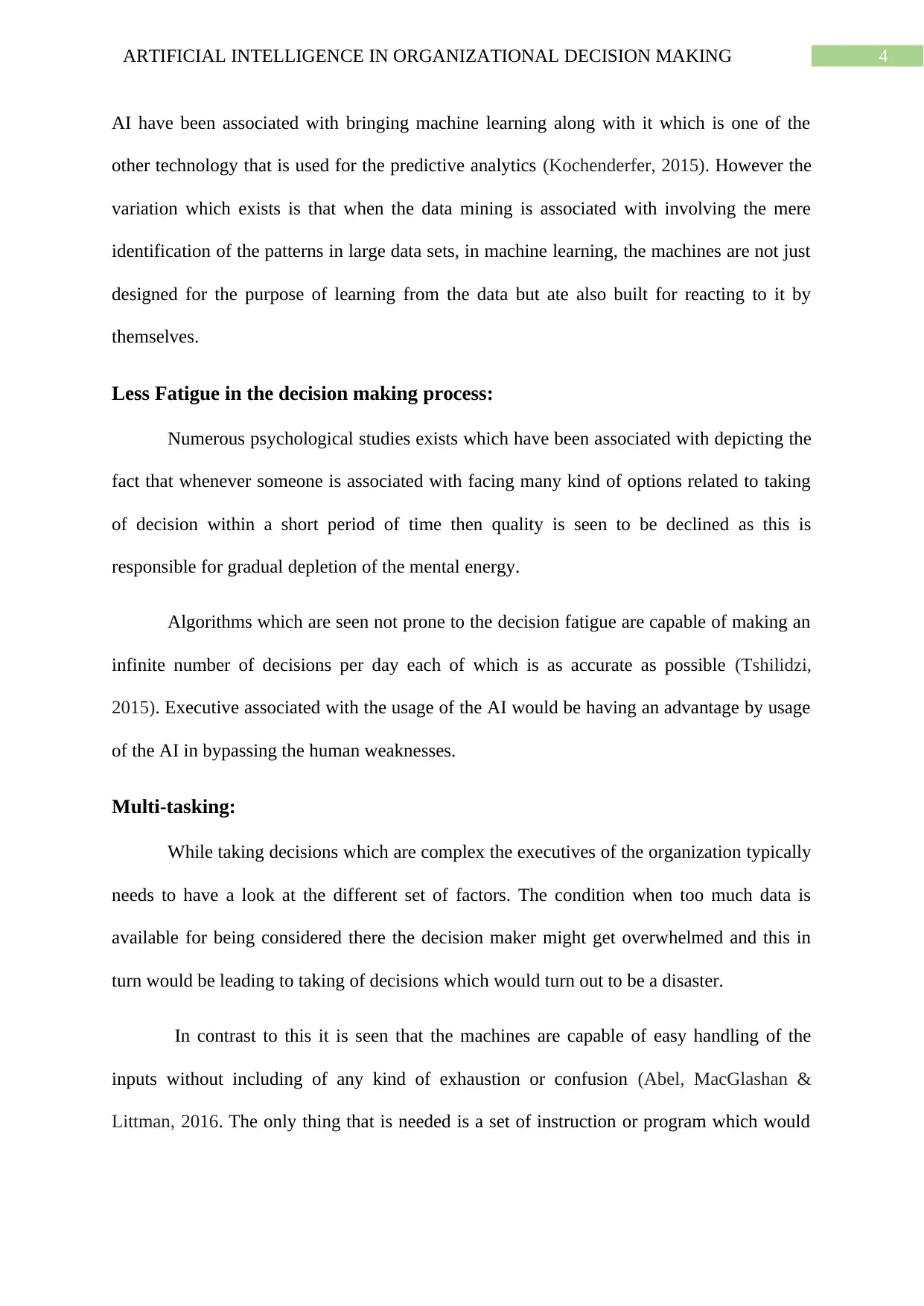
4ARTIFICIAL INTELLIGENCE IN ORGANIZATIONAL DECISION MAKING
AI have been associated with bringing machine learning along with it which is one of the
other technology that is used for the predictive analytics (Kochenderfer, 2015). However the
variation which exists is that when the data mining is associated with involving the mere
identification of the patterns in large data sets, in machine learning, the machines are not just
designed for the purpose of learning from the data but ate also built for reacting to it by
themselves.
Less Fatigue in the decision making process:
Numerous psychological studies exists which have been associated with depicting the
fact that whenever someone is associated with facing many kind of options related to taking
of decision within a short period of time then quality is seen to be declined as this is
responsible for gradual depletion of the mental energy.
Algorithms which are seen not prone to the decision fatigue are capable of making an
infinite number of decisions per day each of which is as accurate as possible (Tshilidzi,
2015). Executive associated with the usage of the AI would be having an advantage by usage
of the AI in bypassing the human weaknesses.
Multi-tasking:
While taking decisions which are complex the executives of the organization typically
needs to have a look at the different set of factors. The condition when too much data is
available for being considered there the decision maker might get overwhelmed and this in
turn would be leading to taking of decisions which would turn out to be a disaster.
In contrast to this it is seen that the machines are capable of easy handling of the
inputs without including of any kind of exhaustion or confusion (Abel, MacGlashan &
Littman, 2016. The only thing that is needed is a set of instruction or program which would
AI have been associated with bringing machine learning along with it which is one of the
other technology that is used for the predictive analytics (Kochenderfer, 2015). However the
variation which exists is that when the data mining is associated with involving the mere
identification of the patterns in large data sets, in machine learning, the machines are not just
designed for the purpose of learning from the data but ate also built for reacting to it by
themselves.
Less Fatigue in the decision making process:
Numerous psychological studies exists which have been associated with depicting the
fact that whenever someone is associated with facing many kind of options related to taking
of decision within a short period of time then quality is seen to be declined as this is
responsible for gradual depletion of the mental energy.
Algorithms which are seen not prone to the decision fatigue are capable of making an
infinite number of decisions per day each of which is as accurate as possible (Tshilidzi,
2015). Executive associated with the usage of the AI would be having an advantage by usage
of the AI in bypassing the human weaknesses.
Multi-tasking:
While taking decisions which are complex the executives of the organization typically
needs to have a look at the different set of factors. The condition when too much data is
available for being considered there the decision maker might get overwhelmed and this in
turn would be leading to taking of decisions which would turn out to be a disaster.
In contrast to this it is seen that the machines are capable of easy handling of the
inputs without including of any kind of exhaustion or confusion (Abel, MacGlashan &
Littman, 2016. The only thing that is needed is a set of instruction or program which would
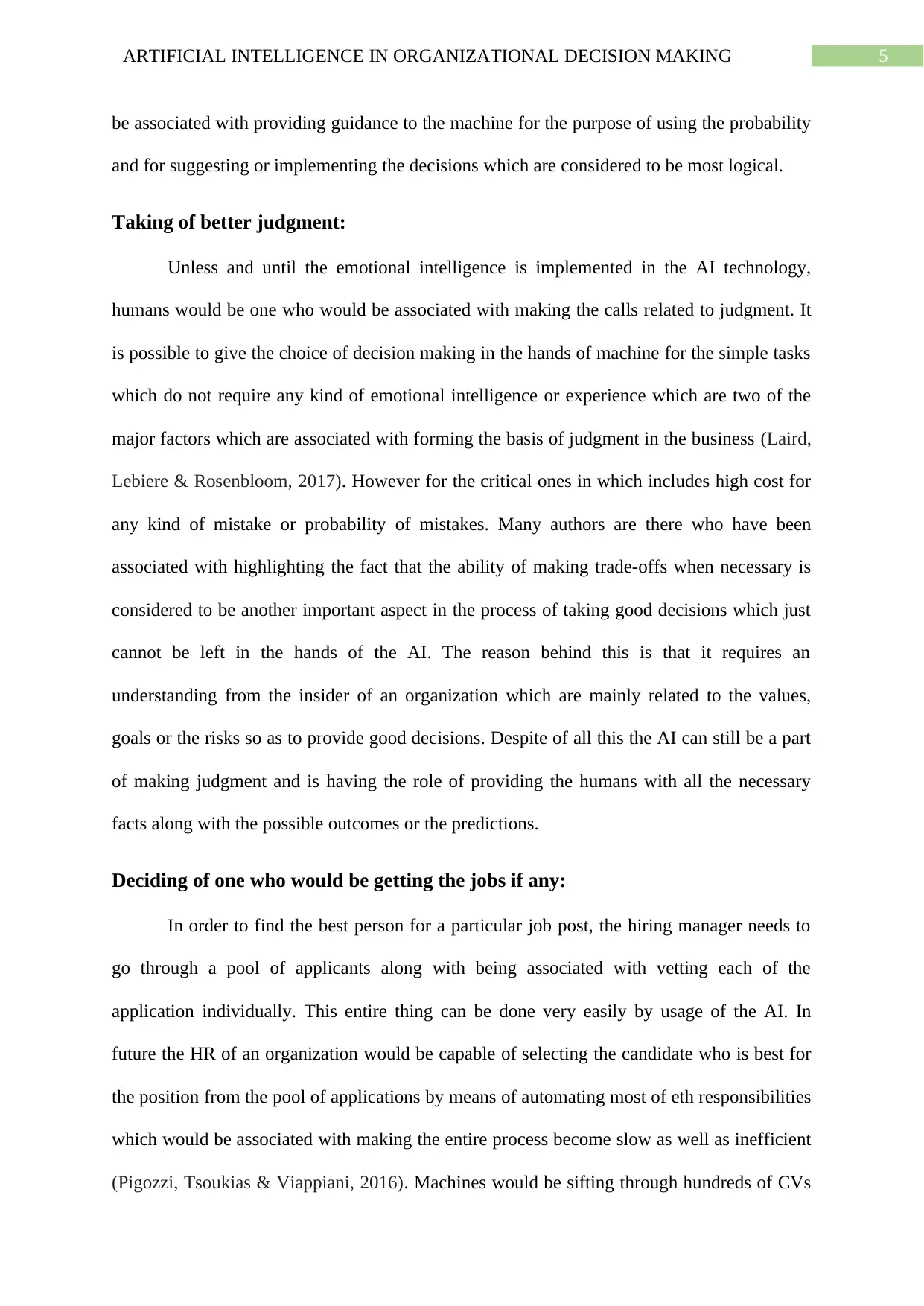
5ARTIFICIAL INTELLIGENCE IN ORGANIZATIONAL DECISION MAKING
be associated with providing guidance to the machine for the purpose of using the probability
and for suggesting or implementing the decisions which are considered to be most logical.
Taking of better judgment:
Unless and until the emotional intelligence is implemented in the AI technology,
humans would be one who would be associated with making the calls related to judgment. It
is possible to give the choice of decision making in the hands of machine for the simple tasks
which do not require any kind of emotional intelligence or experience which are two of the
major factors which are associated with forming the basis of judgment in the business (Laird,
Lebiere & Rosenbloom, 2017). However for the critical ones in which includes high cost for
any kind of mistake or probability of mistakes. Many authors are there who have been
associated with highlighting the fact that the ability of making trade-offs when necessary is
considered to be another important aspect in the process of taking good decisions which just
cannot be left in the hands of the AI. The reason behind this is that it requires an
understanding from the insider of an organization which are mainly related to the values,
goals or the risks so as to provide good decisions. Despite of all this the AI can still be a part
of making judgment and is having the role of providing the humans with all the necessary
facts along with the possible outcomes or the predictions.
Deciding of one who would be getting the jobs if any:
In order to find the best person for a particular job post, the hiring manager needs to
go through a pool of applicants along with being associated with vetting each of the
application individually. This entire thing can be done very easily by usage of the AI. In
future the HR of an organization would be capable of selecting the candidate who is best for
the position from the pool of applications by means of automating most of eth responsibilities
which would be associated with making the entire process become slow as well as inefficient
(Pigozzi, Tsoukias & Viappiani, 2016). Machines would be sifting through hundreds of CVs
be associated with providing guidance to the machine for the purpose of using the probability
and for suggesting or implementing the decisions which are considered to be most logical.
Taking of better judgment:
Unless and until the emotional intelligence is implemented in the AI technology,
humans would be one who would be associated with making the calls related to judgment. It
is possible to give the choice of decision making in the hands of machine for the simple tasks
which do not require any kind of emotional intelligence or experience which are two of the
major factors which are associated with forming the basis of judgment in the business (Laird,
Lebiere & Rosenbloom, 2017). However for the critical ones in which includes high cost for
any kind of mistake or probability of mistakes. Many authors are there who have been
associated with highlighting the fact that the ability of making trade-offs when necessary is
considered to be another important aspect in the process of taking good decisions which just
cannot be left in the hands of the AI. The reason behind this is that it requires an
understanding from the insider of an organization which are mainly related to the values,
goals or the risks so as to provide good decisions. Despite of all this the AI can still be a part
of making judgment and is having the role of providing the humans with all the necessary
facts along with the possible outcomes or the predictions.
Deciding of one who would be getting the jobs if any:
In order to find the best person for a particular job post, the hiring manager needs to
go through a pool of applicants along with being associated with vetting each of the
application individually. This entire thing can be done very easily by usage of the AI. In
future the HR of an organization would be capable of selecting the candidate who is best for
the position from the pool of applications by means of automating most of eth responsibilities
which would be associated with making the entire process become slow as well as inefficient
(Pigozzi, Tsoukias & Viappiani, 2016). Machines would be sifting through hundreds of CVs
⊘ This is a preview!⊘
Do you want full access?
Subscribe today to unlock all pages.

Trusted by 1+ million students worldwide
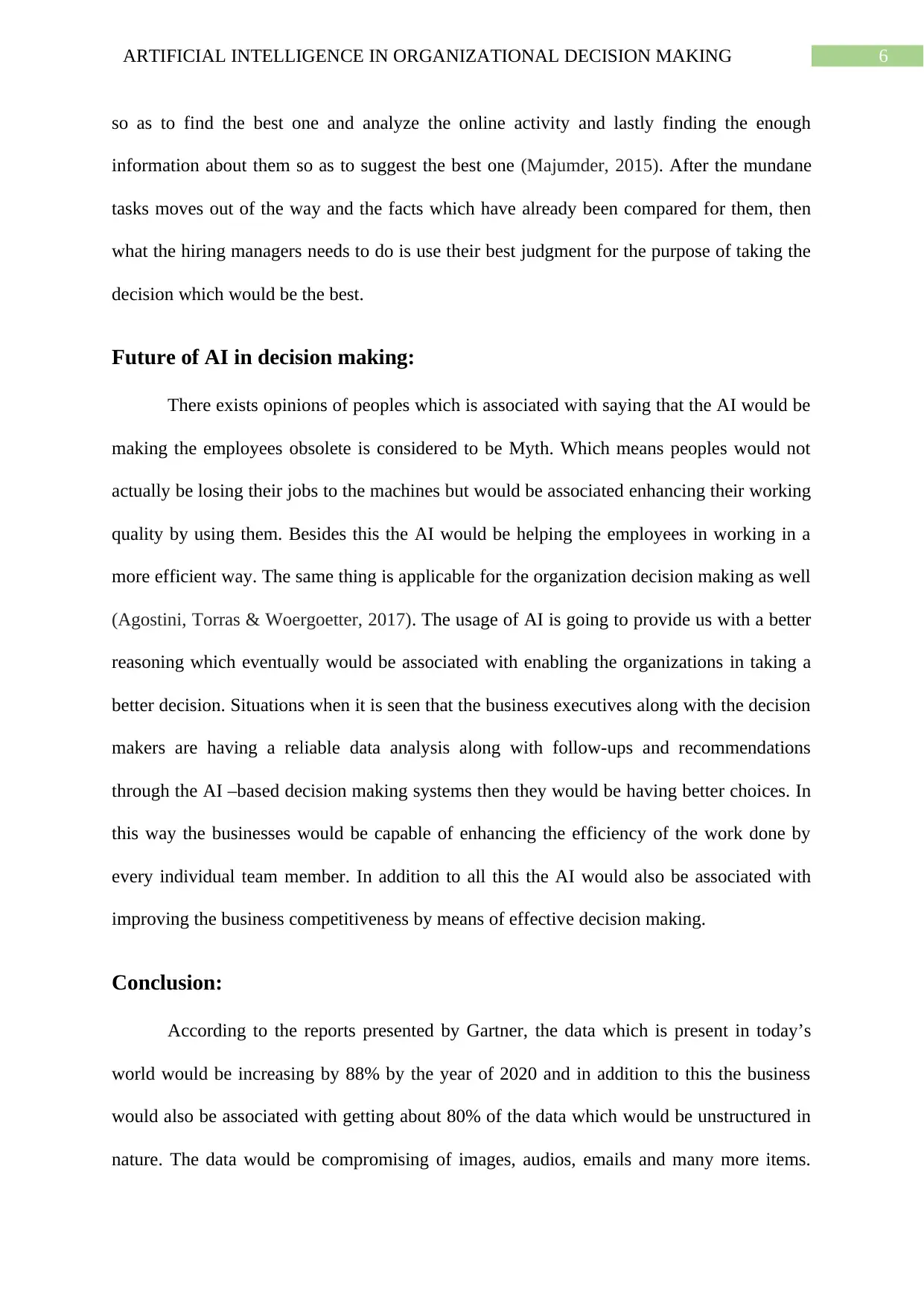
6ARTIFICIAL INTELLIGENCE IN ORGANIZATIONAL DECISION MAKING
so as to find the best one and analyze the online activity and lastly finding the enough
information about them so as to suggest the best one (Majumder, 2015). After the mundane
tasks moves out of the way and the facts which have already been compared for them, then
what the hiring managers needs to do is use their best judgment for the purpose of taking the
decision which would be the best.
Future of AI in decision making:
There exists opinions of peoples which is associated with saying that the AI would be
making the employees obsolete is considered to be Myth. Which means peoples would not
actually be losing their jobs to the machines but would be associated enhancing their working
quality by using them. Besides this the AI would be helping the employees in working in a
more efficient way. The same thing is applicable for the organization decision making as well
(Agostini, Torras & Woergoetter, 2017). The usage of AI is going to provide us with a better
reasoning which eventually would be associated with enabling the organizations in taking a
better decision. Situations when it is seen that the business executives along with the decision
makers are having a reliable data analysis along with follow-ups and recommendations
through the AI –based decision making systems then they would be having better choices. In
this way the businesses would be capable of enhancing the efficiency of the work done by
every individual team member. In addition to all this the AI would also be associated with
improving the business competitiveness by means of effective decision making.
Conclusion:
According to the reports presented by Gartner, the data which is present in today’s
world would be increasing by 88% by the year of 2020 and in addition to this the business
would also be associated with getting about 80% of the data which would be unstructured in
nature. The data would be compromising of images, audios, emails and many more items.
so as to find the best one and analyze the online activity and lastly finding the enough
information about them so as to suggest the best one (Majumder, 2015). After the mundane
tasks moves out of the way and the facts which have already been compared for them, then
what the hiring managers needs to do is use their best judgment for the purpose of taking the
decision which would be the best.
Future of AI in decision making:
There exists opinions of peoples which is associated with saying that the AI would be
making the employees obsolete is considered to be Myth. Which means peoples would not
actually be losing their jobs to the machines but would be associated enhancing their working
quality by using them. Besides this the AI would be helping the employees in working in a
more efficient way. The same thing is applicable for the organization decision making as well
(Agostini, Torras & Woergoetter, 2017). The usage of AI is going to provide us with a better
reasoning which eventually would be associated with enabling the organizations in taking a
better decision. Situations when it is seen that the business executives along with the decision
makers are having a reliable data analysis along with follow-ups and recommendations
through the AI –based decision making systems then they would be having better choices. In
this way the businesses would be capable of enhancing the efficiency of the work done by
every individual team member. In addition to all this the AI would also be associated with
improving the business competitiveness by means of effective decision making.
Conclusion:
According to the reports presented by Gartner, the data which is present in today’s
world would be increasing by 88% by the year of 2020 and in addition to this the business
would also be associated with getting about 80% of the data which would be unstructured in
nature. The data would be compromising of images, audios, emails and many more items.
Paraphrase This Document
Need a fresh take? Get an instant paraphrase of this document with our AI Paraphraser
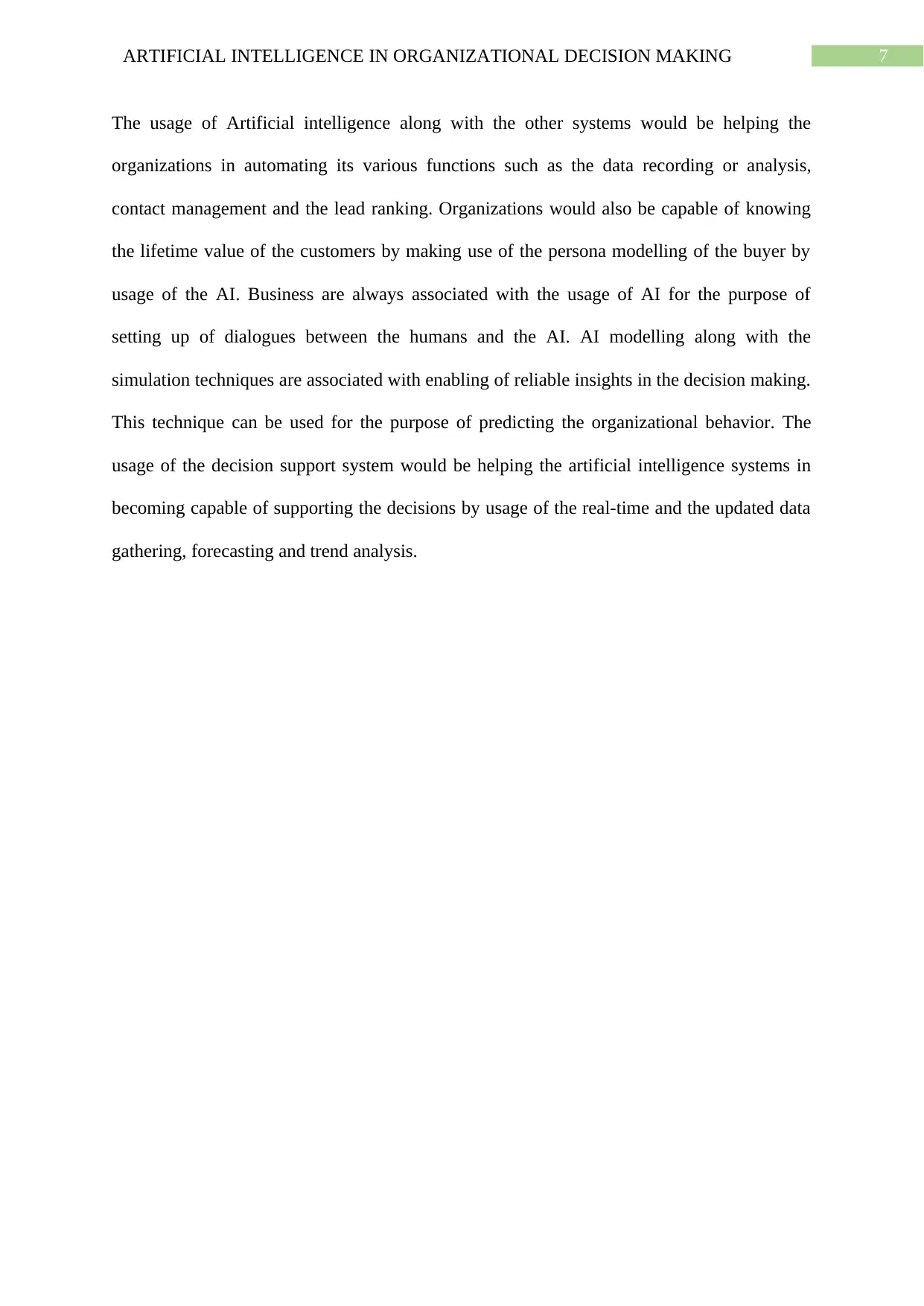
7ARTIFICIAL INTELLIGENCE IN ORGANIZATIONAL DECISION MAKING
The usage of Artificial intelligence along with the other systems would be helping the
organizations in automating its various functions such as the data recording or analysis,
contact management and the lead ranking. Organizations would also be capable of knowing
the lifetime value of the customers by making use of the persona modelling of the buyer by
usage of the AI. Business are always associated with the usage of AI for the purpose of
setting up of dialogues between the humans and the AI. AI modelling along with the
simulation techniques are associated with enabling of reliable insights in the decision making.
This technique can be used for the purpose of predicting the organizational behavior. The
usage of the decision support system would be helping the artificial intelligence systems in
becoming capable of supporting the decisions by usage of the real-time and the updated data
gathering, forecasting and trend analysis.
The usage of Artificial intelligence along with the other systems would be helping the
organizations in automating its various functions such as the data recording or analysis,
contact management and the lead ranking. Organizations would also be capable of knowing
the lifetime value of the customers by making use of the persona modelling of the buyer by
usage of the AI. Business are always associated with the usage of AI for the purpose of
setting up of dialogues between the humans and the AI. AI modelling along with the
simulation techniques are associated with enabling of reliable insights in the decision making.
This technique can be used for the purpose of predicting the organizational behavior. The
usage of the decision support system would be helping the artificial intelligence systems in
becoming capable of supporting the decisions by usage of the real-time and the updated data
gathering, forecasting and trend analysis.
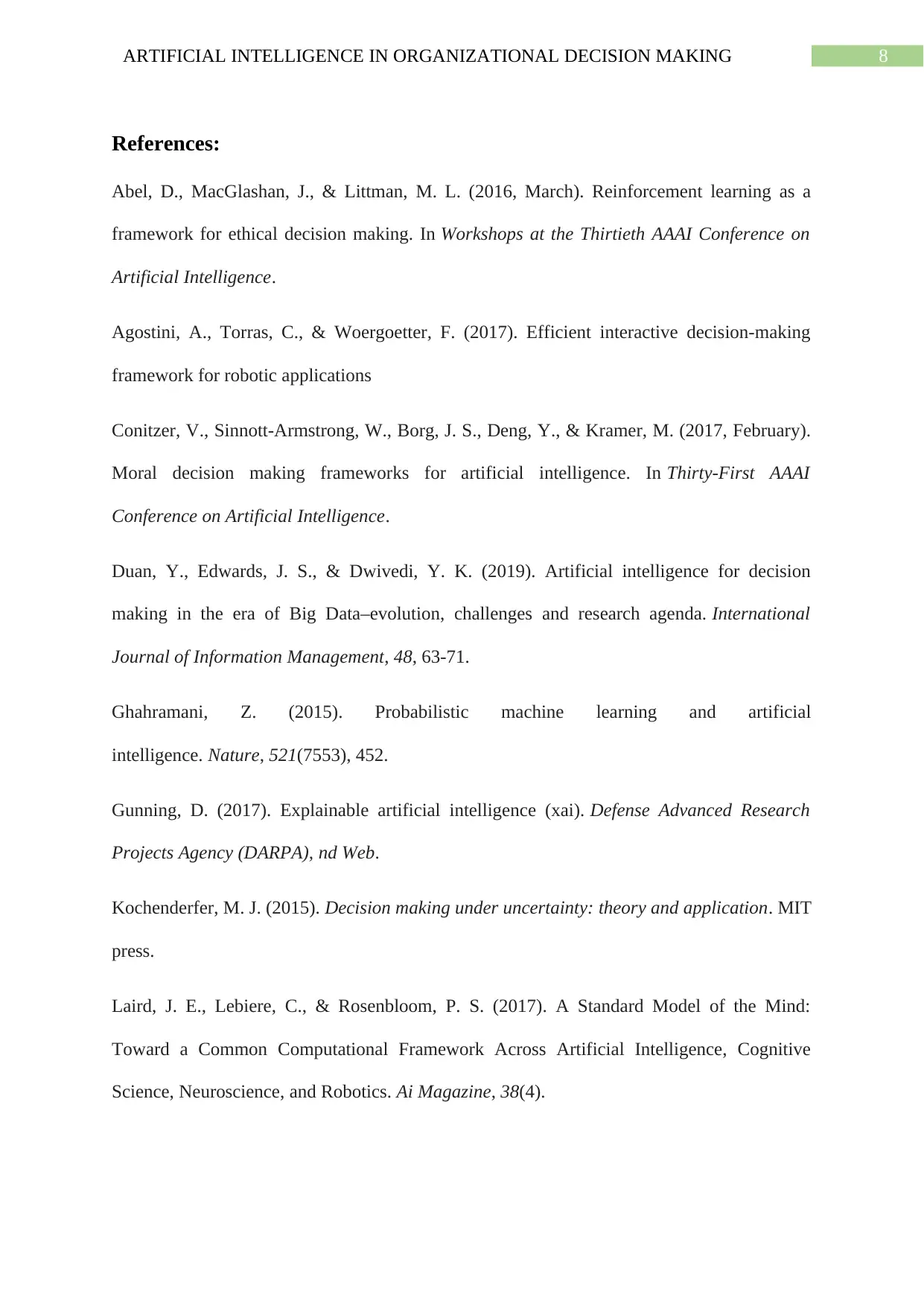
8ARTIFICIAL INTELLIGENCE IN ORGANIZATIONAL DECISION MAKING
References:
Abel, D., MacGlashan, J., & Littman, M. L. (2016, March). Reinforcement learning as a
framework for ethical decision making. In Workshops at the Thirtieth AAAI Conference on
Artificial Intelligence.
Agostini, A., Torras, C., & Woergoetter, F. (2017). Efficient interactive decision-making
framework for robotic applications
Conitzer, V., Sinnott-Armstrong, W., Borg, J. S., Deng, Y., & Kramer, M. (2017, February).
Moral decision making frameworks for artificial intelligence. In Thirty-First AAAI
Conference on Artificial Intelligence.
Duan, Y., Edwards, J. S., & Dwivedi, Y. K. (2019). Artificial intelligence for decision
making in the era of Big Data–evolution, challenges and research agenda. International
Journal of Information Management, 48, 63-71.
Ghahramani, Z. (2015). Probabilistic machine learning and artificial
intelligence. Nature, 521(7553), 452.
Gunning, D. (2017). Explainable artificial intelligence (xai). Defense Advanced Research
Projects Agency (DARPA), nd Web.
Kochenderfer, M. J. (2015). Decision making under uncertainty: theory and application. MIT
press.
Laird, J. E., Lebiere, C., & Rosenbloom, P. S. (2017). A Standard Model of the Mind:
Toward a Common Computational Framework Across Artificial Intelligence, Cognitive
Science, Neuroscience, and Robotics. Ai Magazine, 38(4).
References:
Abel, D., MacGlashan, J., & Littman, M. L. (2016, March). Reinforcement learning as a
framework for ethical decision making. In Workshops at the Thirtieth AAAI Conference on
Artificial Intelligence.
Agostini, A., Torras, C., & Woergoetter, F. (2017). Efficient interactive decision-making
framework for robotic applications
Conitzer, V., Sinnott-Armstrong, W., Borg, J. S., Deng, Y., & Kramer, M. (2017, February).
Moral decision making frameworks for artificial intelligence. In Thirty-First AAAI
Conference on Artificial Intelligence.
Duan, Y., Edwards, J. S., & Dwivedi, Y. K. (2019). Artificial intelligence for decision
making in the era of Big Data–evolution, challenges and research agenda. International
Journal of Information Management, 48, 63-71.
Ghahramani, Z. (2015). Probabilistic machine learning and artificial
intelligence. Nature, 521(7553), 452.
Gunning, D. (2017). Explainable artificial intelligence (xai). Defense Advanced Research
Projects Agency (DARPA), nd Web.
Kochenderfer, M. J. (2015). Decision making under uncertainty: theory and application. MIT
press.
Laird, J. E., Lebiere, C., & Rosenbloom, P. S. (2017). A Standard Model of the Mind:
Toward a Common Computational Framework Across Artificial Intelligence, Cognitive
Science, Neuroscience, and Robotics. Ai Magazine, 38(4).
⊘ This is a preview!⊘
Do you want full access?
Subscribe today to unlock all pages.

Trusted by 1+ million students worldwide
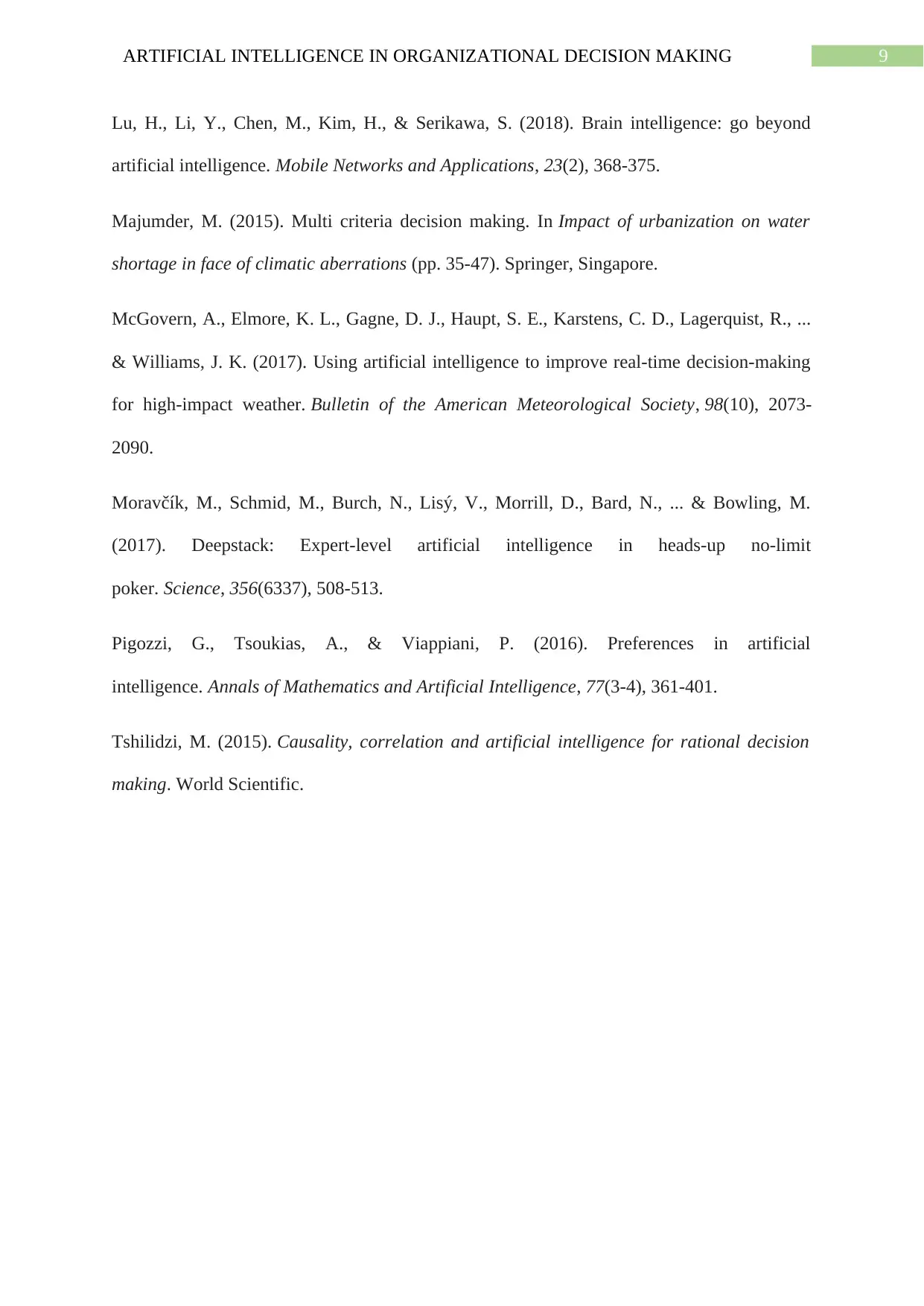
9ARTIFICIAL INTELLIGENCE IN ORGANIZATIONAL DECISION MAKING
Lu, H., Li, Y., Chen, M., Kim, H., & Serikawa, S. (2018). Brain intelligence: go beyond
artificial intelligence. Mobile Networks and Applications, 23(2), 368-375.
Majumder, M. (2015). Multi criteria decision making. In Impact of urbanization on water
shortage in face of climatic aberrations (pp. 35-47). Springer, Singapore.
McGovern, A., Elmore, K. L., Gagne, D. J., Haupt, S. E., Karstens, C. D., Lagerquist, R., ...
& Williams, J. K. (2017). Using artificial intelligence to improve real-time decision-making
for high-impact weather. Bulletin of the American Meteorological Society, 98(10), 2073-
2090.
Moravčík, M., Schmid, M., Burch, N., Lisý, V., Morrill, D., Bard, N., ... & Bowling, M.
(2017). Deepstack: Expert-level artificial intelligence in heads-up no-limit
poker. Science, 356(6337), 508-513.
Pigozzi, G., Tsoukias, A., & Viappiani, P. (2016). Preferences in artificial
intelligence. Annals of Mathematics and Artificial Intelligence, 77(3-4), 361-401.
Tshilidzi, M. (2015). Causality, correlation and artificial intelligence for rational decision
making. World Scientific.
Lu, H., Li, Y., Chen, M., Kim, H., & Serikawa, S. (2018). Brain intelligence: go beyond
artificial intelligence. Mobile Networks and Applications, 23(2), 368-375.
Majumder, M. (2015). Multi criteria decision making. In Impact of urbanization on water
shortage in face of climatic aberrations (pp. 35-47). Springer, Singapore.
McGovern, A., Elmore, K. L., Gagne, D. J., Haupt, S. E., Karstens, C. D., Lagerquist, R., ...
& Williams, J. K. (2017). Using artificial intelligence to improve real-time decision-making
for high-impact weather. Bulletin of the American Meteorological Society, 98(10), 2073-
2090.
Moravčík, M., Schmid, M., Burch, N., Lisý, V., Morrill, D., Bard, N., ... & Bowling, M.
(2017). Deepstack: Expert-level artificial intelligence in heads-up no-limit
poker. Science, 356(6337), 508-513.
Pigozzi, G., Tsoukias, A., & Viappiani, P. (2016). Preferences in artificial
intelligence. Annals of Mathematics and Artificial Intelligence, 77(3-4), 361-401.
Tshilidzi, M. (2015). Causality, correlation and artificial intelligence for rational decision
making. World Scientific.
1 out of 10
Related Documents
Your All-in-One AI-Powered Toolkit for Academic Success.
+13062052269
info@desklib.com
Available 24*7 on WhatsApp / Email
![[object Object]](/_next/static/media/star-bottom.7253800d.svg)
Unlock your academic potential
Copyright © 2020–2026 A2Z Services. All Rights Reserved. Developed and managed by ZUCOL.





